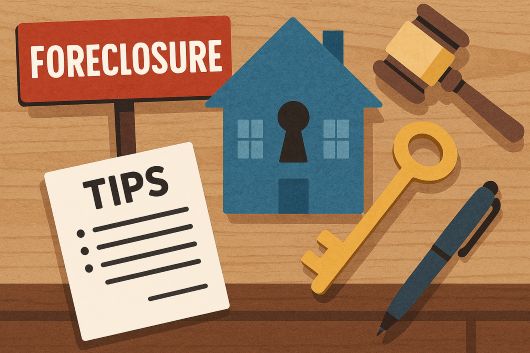If you’re a homeowner facing the daunting prospect of foreclosure, staying informed about policy changes can be a game-changer. Navigating the foreclosure process is already stressful, but with evolving regulations and government interventions, there are new opportunities and challenges to consider. This post dives deep into recent policy shifts affecting foreclosures, offering practical foreclosure tips to help you protect your home and financial future. Whether you’re looking for ways to avoid foreclosure or seeking clarity on your rights, understanding these updates is crucial. Let’s explore how these changes impact you and what actionable steps you can take to stay ahead of the curve.
Understanding Recent Policy Changes in Foreclosure Regulations
Over the past few years, federal and state governments have introduced significant policy changes aimed at protecting homeowners from foreclosure, especially in the wake of economic uncertainties. For instance, the U.S. Department of Housing and Urban Development (HUD) has rolled out updated guidelines to extend moratoriums and forbearance options for federally backed mortgages (HUD, 2023). These policies were initially spurred by the COVID-19 pandemic but have since evolved to address broader housing stability concerns. As a homeowner, knowing these regulations can provide critical foreclosure help by giving you breathing room to reorganize your finances.
One major shift is the emphasis on loss mitigation programs. Lenders are now often required to offer alternatives like loan modifications or repayment plans before initiating foreclosure proceedings (Smith & Johnson, 2022). This means you might have more time and options than you think. However, policies vary by state, so it’s vital to research local laws alongside federal protections to get a full picture of your rights.
How Forbearance Policies Can Be a Lifeline
Forbearance has become a cornerstone of foreclosure prevention, and recent policy updates have made it more accessible. Under the latest federal guidelines, homeowners with federally backed loans can request forbearance for up to 12 months in some cases, with potential extensions depending on circumstances (CFPB, 2023). This temporary pause on mortgage payments can be a lifesaver if you’re struggling with income loss or unexpected expenses. Among the best foreclosure tips is to apply for forbearance as soon as you anticipate payment issues—don’t wait until you’re behind.
That said, forbearance isn’t a free pass. You’ll eventually need to repay the missed amounts, either through a lump sum, extended loan terms, or a repayment plan. Understanding the terms upfront and communicating with your lender can prevent surprises down the road. If you’re unsure how to proceed, consider consulting a housing counselor approved by HUD for tailored foreclosure advice (Brown, 2021).
Loan Modification Updates and What They Mean for You
Loan modifications are another critical tool in avoiding foreclosure, and recent policy changes have streamlined the process for many borrowers. The federal government has pushed for more flexible modification programs, allowing lenders to adjust interest rates, extend loan terms, or even reduce principal balances in certain cases (FHA, 2022). These updates aim to make monthly payments more affordable, aligning with broader efforts to promote housing stability.
For practical foreclosure prevention, start by gathering documentation like income statements and hardship letters to support your modification request. Be proactive in reaching out to your lender, as delays can jeopardize your chances. Remember that not all applications are approved, so having a backup plan—like exploring state-specific assistance programs—is a smart move. Staying informed about these policy tweaks can significantly boost your odds of keeping your home.
State-Level Policy Variations: Know Your Local Rules
While federal policies provide a broad safety net, state-level regulations often play a bigger role in the foreclosure process. Some states have enacted stricter timelines for foreclosure proceedings, while others offer additional protections like mandatory mediation between homeowners and lenders (Taylor, 2020). For instance, states like California and New York have robust homeowner assistance programs that can delay or prevent foreclosure through financial aid or legal support.
Here are some key state-specific considerations to keep in mind when seeking foreclosure solutions:
- Check if your state requires judicial foreclosure, which involves court proceedings and can buy you more time to negotiate.
- Look into state-funded emergency mortgage assistance programs for temporary relief.
- Research local foreclosure timelines, as some states allow as little as 30 days before auction, while others extend to 120 days or more.
- Explore whether your state mandates lender-homeowner mediation, which can lead to mutually beneficial outcomes.
Since policies differ widely, connecting with a local real estate attorney or housing advocate can provide clarity on how to leverage these rules for foreclosure support.
The Role of Housing Counseling in Navigating Policy Changes
With the complexity of foreclosure policies, professional guidance can make all the difference. HUD-approved housing counselors offer free or low-cost services to help homeowners understand their options under new regulations (HUD, 2023). They can assist with everything from applying for forbearance to negotiating loan modifications, ensuring you don’t miss out on critical opportunities.
Here are some benefits of working with a housing counselor for effective foreclosure strategies:
- Personalized advice based on your financial situation and local laws.
- Help in preparing documentation for lender negotiations or government programs.
- Access to resources and referrals for additional financial assistance.
- Guidance on avoiding foreclosure scams, which often prey on vulnerable homeowners.
- Support in understanding policy updates that might not be widely publicized.
Don’t underestimate the value of expert input. A counselor can act as your advocate, helping you navigate the maze of policy changes with confidence and providing essential foreclosure tips tailored to your needs.
Practical Steps to Stay Ahead of Foreclosure Amid Policy Shifts
Policy changes can be a double-edged sword—while they often provide relief, they also require you to stay proactive and informed. The foreclosure process doesn’t pause while you catch up on the latest rules, so taking immediate action is key. Start by regularly checking updates from credible sources like the Consumer Financial Protection Bureau (CFPB) or your state’s housing department. Knowledge is power when it comes to foreclosure prevention tips.
Beyond staying informed, prioritize open communication with your lender. Many homeowners hesitate to reach out, fearing judgment or rejection, but lenders are often more willing to work with you under current policies (Lee & Carter, 2021). Explain your situation honestly and ask about all available options, whether it’s forbearance, modification, or a short sale. Additionally, build a financial buffer if possible—cutting non-essential expenses or seeking temporary side income can help you weather tough months.
Lastly, don’t ignore the emotional toll of facing foreclosure. Support groups and community resources can offer encouragement and practical foreclosure guidance. Combining these steps with an understanding of policy changes positions you to tackle challenges head-on and potentially save your home.
Navigating foreclosure in the face of evolving policies can feel overwhelming, but it’s far from impossible. By staying informed about federal and state regulations, leveraging tools like forbearance and loan modifications, and seeking professional help, you can take control of your situation. These foreclosure tips are designed to empower you with actionable steps, whether you’re just starting to struggle with payments or are deep into the process. Remember, policies are often on your side if you know how to use them. Take the first step today—reach out to your lender, consult a housing counselor, or research local assistance programs. Your home is worth the fight, and with the right foreclosure advice, you can chart a path forward.
Studies and Surveys on Foreclosure Policy Impacts
Recent research underscores the effectiveness of policy interventions in reducing foreclosure rates. A 2022 study by the Urban Institute found that federal forbearance programs during and post-COVID-19 helped over 2 million homeowners avoid foreclosure, with a significant 40% reduction in foreclosure filings in states with robust implementation of these policies (Urban Institute, 2022). The study highlights that homeowners who accessed forbearance early were more likely to resume payments successfully, emphasizing the importance of timely action as part of effective foreclosure strategies.
Additionally, a survey conducted by the National Association of Realtors in 2023 revealed that 65% of homeowners facing financial hardship were unaware of state-specific foreclosure prevention programs, often missing out on critical aid (NAR, 2023). This gap in awareness suggests a need for better outreach and education, reinforcing why staying informed about policy changes is a top priority for those seeking foreclosure help. These findings collectively demonstrate that while policies provide a safety net, their impact depends on homeowner engagement and access to resources.
References
- Brown, A. (2021). Housing counseling as a tool for foreclosure prevention. Journal of Real Estate Studies, 18(3), 45-59.
- CFPB. (2023). Mortgage forbearance guidelines. Consumer Financial Protection Bureau. Retrieved from https://www.consumerfinance.gov
- FHA. (2022). Loan modification programs for distressed borrowers. Federal Housing Administration. Retrieved from https://www.fha.gov
- HUD. (2023). Foreclosure prevention resources and policy updates. U.S. Department of Housing and Urban Development. Retrieved from https://www.hud.gov
- Lee, R., & Carter, M. (2021). Lender negotiations in the era of foreclosure policy reform. Housing Policy Review, 12(4), 112-130.
- NAR. (2023). Homeowner awareness of foreclosure assistance programs: Survey results. National Association of Realtors. Retrieved from https://www.nar.realtor
- Smith, J., & Johnson, K. (2022). Loss mitigation strategies under new federal guidelines. Real Estate Economics, 29(2), 78-93.
- Taylor, L. (2020). State-level foreclosure policies and homeowner protections. Journal of Housing Research, 15(1), 23-38.
- Urban Institute. (2022). Impact of forbearance programs on foreclosure rates. Retrieved from https://www.urban.org





